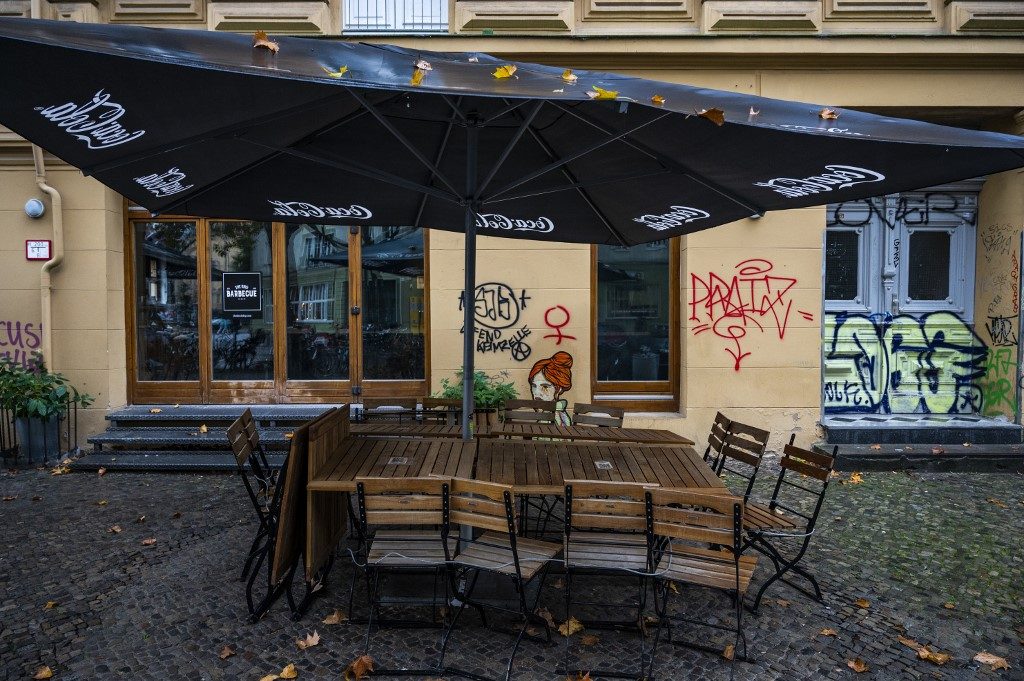SUMMARY
This is AI generated summarization, which may have errors. For context, always refer to the full article.

The German economy grew by 8.2 percent in the 3rd quarter and is forecast to shrink less than expected in 2020, official data showed Friday, October 30, even as the country faces new shutdowns to contain a second coronavirus wave.
Federal statistics agency Destatis said the rebound in July to September, coming after a historic slump in the 2nd quarter, was driven by “higher final consumption expenditure of households, higher capital formation in machinery and equipment, and a sharp increase in exports.”
Analysts from financial information service Factset had predicted an increase in gross domestic product of 7.4% after a plunge of almost 10% during the 2nd quarter.
Overall, the government now expects Europe’s top economy to shrink by 5.5% in 2020, Economy Minister Peter Altmaier said – an improvement on September’s prediction of 5.8%.
Its estimate of 4.4% growth for 2021 remains unchanged.
The recovery is subject to the further development of the pandemic, “but I am sure that with the tough and decisive measures we have taken…we have a real chance to achieve this growth,” Altmaier said.
New shutdowns
Germany, like the rest of the continent, has in recent weeks been engulfed by a second wave of COVID-19, with European Central Bank chief Christine Lagarde noting that recovery in the single currency zone was “losing momentum more rapidly than expected.”
Having been praised for its handling of the first wave in the spring, the country is now regularly reporting more than 10,000 new cases a day and saw a peak of 18,600 on Friday.
Cultural, leisure, as well as food and drink sectors have been ordered to close from Monday, November 2, to the end of November, in a new round of shutdowns that industries have warned could lead to a raft of bankruptcies.
To reflect the pandemic situation, the government has revised downwards its prediction for growth in the 4th quarter from 1.1% to 0.4%.
But Altmaier said he was optimistic that the impact of the shutdowns would not be as great as earlier in the year.
“The economy is much better prepared for the pandemic and for the need to control it in the autumn than it was in spring,” he said.
While Europe locks down again to confront the virus flare-up, Asia remains open for business, helping German exporters and carmakers especially.
Europe’s supply chains are also unaffected this time around as European Union borders stay open, he added.
‘We will go bankrupt’
German restaurants, bars, and cultural facilities will be closed from next week, though schools, daycare centers, and shops will remain open.
The KfW public investment bank has predicted that more than a million jobs could be lost this year in small- and medium-sized enterprises.
Many blue-chip German businesses have already announced sweeping job cuts, including 30,000 at flagship airline Lufthansa, 8,000 at tour operator TUI, and 6,000 at carmaker BMW.
In the hospitality sector, professional associations are warning that up to a third of hotels and restaurants could be forced to close their doors for good by the end of the year.
“Over the last 8 months, our turnover has plunged between 90 and 100%,” said Cordula Weidenbach, whose company rents out furniture for trade fairs in Munich.
“If this continues, we will go bankrupt.”
Berlin has pledged an extra 10 billion euros ($12 billion) in aid for businesses affected by the November shutdown.
Companies will be compensated for up to 75% of their turnover during the weeks they are forced to close, whereas previous aid could only be used to cover fixed costs such as rent and utility bills.
The government has also already extended its short-time working scheme for a total of 24 months.
But some analysts fear it will not be enough to prevent long-term damage.
“There is unfortunately still no evidence that you can simply turn on and off an economy like a light switch without causing more structural damage,” said Carsten Brzeski of the ING bank, warning that “a double-dip looks unavoidable.” – Rappler.com
Add a comment
How does this make you feel?


![[Time Trowel] Evolution and the sneakiness of COVID](https://www.rappler.com/tachyon/2024/02/tl-evolution-covid.jpg?resize=257%2C257&crop=455px%2C0px%2C1080px%2C1080px)







There are no comments yet. Add your comment to start the conversation.